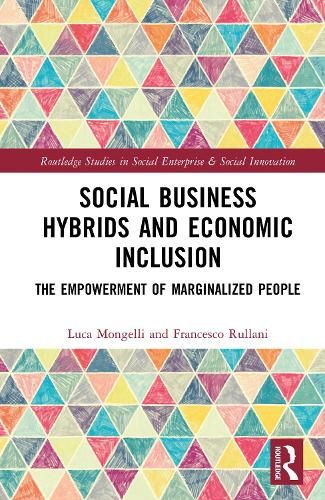Readings Newsletter
Become a Readings Member to make your shopping experience even easier.
Sign in or sign up for free!
You’re not far away from qualifying for FREE standard shipping within Australia
You’ve qualified for FREE standard shipping within Australia
The cart is loading…






This book addresses marginalization as a form of disempowerment - social, economic, and political exclusion that prevents people from realizing their potential. In response, it explores how organizations can foster empowerment, focusing on Social Business Hybrids (SBHs), which use market-based strategies to activate the economic capabilities of marginalized people. However, such empowerment only succeeds under specific conditions, especially in relation to the environments - or "loci" - where SBHs operate.
The book aims to understand both the transformative actions SBHs undertake and the contexts in which these actions occur. Drawing from the Capabilities Approach (Sen, Nussbaum, Kabeer) and Community Psychology (Rappaport), the authors develop a framework integrating two key concepts: the empowering role of organizations and an ecological perspective that considers the relevance of social spaces.
They identify two main types of SBH actions: "creation empowerment" and "access empowerment", and two types of empowerment spaces: "safe spaces" and "open spaces for reconnection". These dimensions come together in the proposed SBH Empowering Matrix, which outlines four strategies - safe creation, open creation, safe access, and open access. Each is illustrated through a dedicated case study, providing practical insights into how SBHs can unlock the potential of marginalized people.
$9.00 standard shipping within Australia
FREE standard shipping within Australia for orders over $100.00
Express & International shipping calculated at checkout
Stock availability can be subject to change without notice. We recommend calling the shop or contacting our online team to check availability of low stock items. Please see our Shopping Online page for more details.
This book addresses marginalization as a form of disempowerment - social, economic, and political exclusion that prevents people from realizing their potential. In response, it explores how organizations can foster empowerment, focusing on Social Business Hybrids (SBHs), which use market-based strategies to activate the economic capabilities of marginalized people. However, such empowerment only succeeds under specific conditions, especially in relation to the environments - or "loci" - where SBHs operate.
The book aims to understand both the transformative actions SBHs undertake and the contexts in which these actions occur. Drawing from the Capabilities Approach (Sen, Nussbaum, Kabeer) and Community Psychology (Rappaport), the authors develop a framework integrating two key concepts: the empowering role of organizations and an ecological perspective that considers the relevance of social spaces.
They identify two main types of SBH actions: "creation empowerment" and "access empowerment", and two types of empowerment spaces: "safe spaces" and "open spaces for reconnection". These dimensions come together in the proposed SBH Empowering Matrix, which outlines four strategies - safe creation, open creation, safe access, and open access. Each is illustrated through a dedicated case study, providing practical insights into how SBHs can unlock the potential of marginalized people.